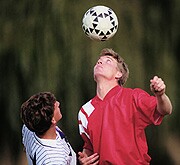- 8 Ways to Increase Dopamine Naturally
- 7 Best Breads for Maintaining Stable Blood Sugar
- Gelatin vs. Collagen: Which is Best for Skin, Nails, and Joints?
- The Long-Term Effects of Daily Turmeric Supplements on Liver Health
- Could Your Grocery Store Meat Be Causing Recurring UTIs?
- Are You Making This Expensive Thermostat Error This Winter?
- Recognizing the Signs of Hypothyroidism
- 10 Strategies to Overcome Insomnia
- Could Artificial Sweeteners Be Aging the Brain Faster?
- Techniques for Soothing Your Nervous System
‘Heading’ Soccer Ball Can Damage Brain, Study Says


Heading a soccer ball — a common move on the playing field — can have serious, long-term effects on the brain, warns a Canadian researcher.
Concussions account for as many as 8.6 percent of injuries in soccer, according to a study by Dr. Tom Schweizer, director of the neuroscience research program at St. Michael’s Hospital in Toronto. Some of these concussions are caused by collisions, while others come from heading — deliberately using your head to control the ball.
Not enough attention is paid to the consequences of this particular tactic, which can have lasting effects on thinking and memory even when the blows to the head aren’t severe enough to cause a concussion, Schweizer said.
“The practice of heading, which might occur thousands of times over a player’s career, carries unknown risks, but may uniquely contribute to cognitive decline or impairment in the short- or long-term,” Schweizer explained in a hospital news release.
“Thus, soccer players present a unique opportunity to study whether cumulative sub-concussive impacts affect cognitive functioning, similar to that of concussions,” he said.
In a review of existing studies published online recently in the journal Brain Injury, Schweizer examined how often concussions occur in soccer.
One study revealed that nearly 63 percent of varsity soccer players had symptoms of a concussion at some point, but only about 19 percent knew it. In another study, nearly 82 percent of players who had at least one concussion had two or more of these head injuries. The research found that those who suffered one concussion had a 3.15 times greater chance of having another one than players who never had this type of injury.
A separate study also revealed that soccer-related concussions accounted for 15 percent of all sports concussions. Girls’ soccer was second only to football for sports-related concussions, accounting for 8.2 percent of these head injuries, the study found.
The long-term result of these head injuries included problems with memory, planning and perception, the review found. One study noted that professional soccer players who engaged in the most heading performed the worst on verbal and visual memory tests as well as tests of their attention span. A separate study also found older and retired players had significant problems with conceptual thinking, reaction times and concentration.
The studies that involved brain imaging found players who suffered concussions had physical changes to their brain.
Preventive measures can be taken to protect soccer players from serious head injuries, the study authors said.
“Use of protective headgear, limiting heading exposure or stressing proper heading technique in younger children and increasing concussion education are all suggestions to perhaps decrease the incidence of head injury and their subsequent effects in the long run,” study co-author Monica Maher, who is studying for a master’s degree in neuroscience at the University of Toronto, said in the news release.
Soccer, the most popular and fastest-growing sport in the world, is played by 27 million people in North America, according to the news release.
More information
The Brain Injury Association of America provides more information on concussions and other head injuries.
Source: HealthDay
Copyright © 2026 HealthDay. All rights reserved.










